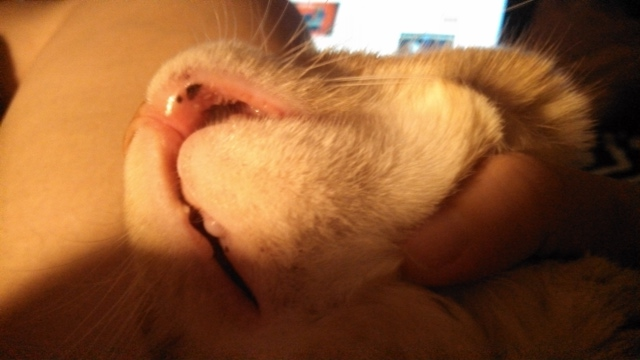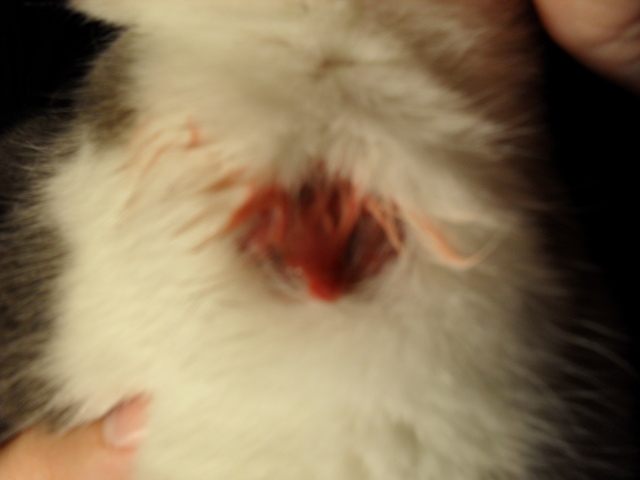QuestionQUESTION: I foster kittens and have been doing so for 8 months. I got my own kitten (now 9 months old) from my very first litter, when she was almost 6 weeks old.
We just recently had a 12 week old russian blue. She was breathing oddly (small breaths that let out quickly), but other than that seemed fine. She was shy and spent 90% of her time inside a drawer in my desk. The two cats never slept or washed or even really liked each other as far as I could tell. There was no blood, but they would growl at each other if one neared. They shared 3 litter boxes and a water dish (with one other kitten as well).
I came home late one night and took my kitten out of the spare room and was too tired to take out the other kitten (to put back in my room). The next morning the other kitten (who had been fine the previous morning) was very sick (mucus coming from her mouth, nose and eyes and could hardly stand, had a high fever and would not eat or drink). The next day she tested positive for Feline Leukemia. (The rescue tests the moms and her mother was negative.).
My kitten and the other kitten that was with me (adopted out a week before the sick kitten tested positive) are now quarantined (in their own houses). It has been 2 weeks since and my 9 month old is showing no signs of illness...she plays constantly, snuggles big time, eats and drinks just as she used to and has normal breathing and temperature. She gets tested in another 4 weeks and then again 2 weeks after that. No other cats were exposed. Are there signs I should look for that says she has caught the virus? She is very healthy and has yet to catch anything another kitten brought in and is taking an immunity supplement. Is there anything else I can do/look for?
ANSWER: Wow this is a bad one. All you can do Brianna is pray that your kitten's tests keep coming back negative. They can get it from sharing a water bowl, as well as from airborne particles. However, the most common transmissions are from fighting, mating, and mutual grooming.
Your cat won't necessarily show symptoms like the other kitten did. Cats can have leukemia for years and never be sick from it until later. The problem is, however, that they are carriers and are contagious to all cats. Even vaccinated cats are at a small risk because no vaccine is 100%.
Make sure your kitten is vaccinated and bleach any areas that the other kitten was in. Bleach all the bowls and litter boxes as well. leukemia isn't one of the most hardy viruses but it is better to be safe than sorry.
I am sorry for the loss of your foster kitty. It's hard to lose one no matter what.
---------- FOLLOW-UP ----------
QUESTION: We did make sure to bleach or get rid of anything the other kitten touched the minute we found out. Our other cats have been vaccinated against leukemia. They were never in contact with the foster kitten or anything that she touched. My own kitten has her other vaccinations, but not against feline leukemia.
I do know that they never fought or mated. They mainly kept a distance from each other. They never even slept within 2 feet of each other... I've been told that the older a cat is, the less of a chance they have of getting it and that kittens retain anti-bodies from their mother to fight off the virus. Is this true? And if so, how much of it applies to a 9 month old kitten?
We are keeping out fingers crossed. She's always had a very strong immune system, so we hope she can fight this off as well.
AnswerNo kitten or puppy maternal antibody last beyond 16 weeks tops. Usually they are long gone before that which is one reason puppies get parvo so easily. Between the shots and the maternal antibodies waning off, the virus gets a hold of them. The antibodies fight the vaccine at that point, when they are strong. So they kill off the vaccine and then protect the animal at the same time. But if the cat/puppy doesn't keep getting their shots, then the maternal antibodies can disappear and no one knows when, then then virus attacks.
Same holds true for leukemia and cats- but since she has not been vaccinated she is not protected from this virus. Her immune system can fight it off however, if she is really healthy and had minimal contact. Since she has already been tested negative, hopefully she will continue to be. They can sero-convert however and become positive if they are exposed heavily.
Keep your fingers crossed.
--------------------------------------------------------
Brianna,
I am not a vet but a vet tech. You will always get different answers from everyone. It all depends on what they read.

 sick little puggie
Question
lola
My year old chug (chihuahua pug cr
sick little puggie
Question
lola
My year old chug (chihuahua pug cr
 excessive allround hair-loss
Question
Laila
I have a female lab, 4 years of age. She
excessive allround hair-loss
Question
Laila
I have a female lab, 4 years of age. She
 Stinky Cat
QuestionHi Marie,
I work with a dog/cat rescue in my a
Stinky Cat
QuestionHi Marie,
I work with a dog/cat rescue in my a
 sore on lip
Question
lilly lip
Hello, Im writing to ask abou
sore on lip
Question
lilly lip
Hello, Im writing to ask abou
 My Cat Has some kind of abrasion
Question
The abrasion
I noticed my cat had some
My Cat Has some kind of abrasion
Question
The abrasion
I noticed my cat had some